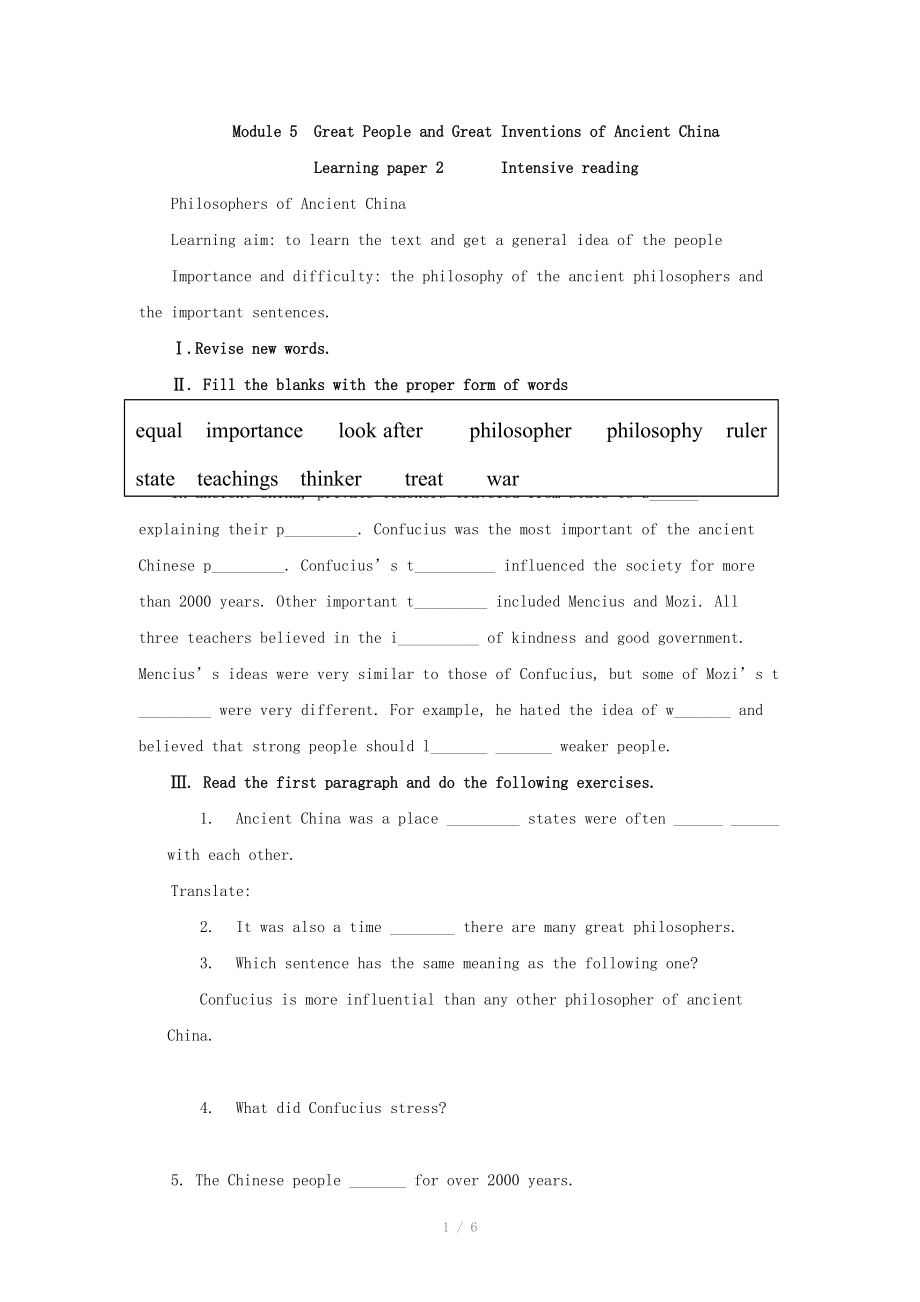《高一英語學(xué)案:Module 5 great people and great inventions of Ancient china(外研必修3)》由會員分享��,可在線閱讀,更多相關(guān)《高一英語學(xué)案:Module 5 great people and great inventions of Ancient china(外研必修3)(6頁珍藏版)》請在裝配圖網(wǎng)上搜索�。
1、
Module 5 Great People and Great Inventions of Ancient China
Learning paper 2 Intensive reading
Philosophers of Ancient China
Learning aim: to learn the text and get a general idea of the people
Importance and difficulty: the philosophy of the ancient philosophers and the important sente
2�、nces.
Ⅰ.Revise new words.
Ⅱ. Fill the blanks with the proper form of words
equal importance look after philosopher philosophy ruler state teachings thinker treat war
In ancient china, private teachers traveled from state to s______ explaining their p_________. Confucius
3�、was the most important of the ancient Chinese p_________. Confucius’s t__________ influenced the society for more than 2000 years. Other important t_________ included Mencius and Mozi. All three teachers believed in the i__________ of kindness and good government. Mencius’s ideas were very similar t
4、o those of Confucius, but some of Mozi’s t _________ were very different. For example, he hated the idea of w_______ and believed that strong people should l_______ _______ weaker people.
Ⅲ. Read the first paragraph and do the following exercises.
1. Ancient China was a place _________ states were
5��、 often ______ ______ with each other.
Translate:
2. It was also a time ________ there are many great philosophers.
3. Which sentence has the same meaning as the following one?
Confucius is more influential than any other philosopher of ancient China.
4. What did Confucius stress?
5. The C
6����、hinese people _______ for over 2000 years.
A. followed Confucius teachings B. influenced Confucius
2 / 6
Ⅳ. Read paragraph 2 and do the following exercises.
1. Mencius was a thinker _______ _______ were very similar to those of Confucius.
Translating:
2. Mencius believed that the reason ___
7、___ man is different from animals is ______ man is good.
Translate:
3. Put the sentences in order of time.
a. His father died when he was young.
b. He was given an important position in the government of a state.
c. When he saw that the rulers were not following his advice, he resigned.
d. He
8�����、became an adviser to another ruler.
e. He was born in 372BC.
f. He was brought up by his mother.
g. He traveled from state to state teaching the principles of Confucius.
h. He spent his last years preparing a book of his teachings called The Book of Mencius.
4. When would people be good, in Men
9、cius’s opinion?
5. Who did Mencius think more important, people or rulers?
Ⅴ. Read paragraph 3 and do the following exercises.
1. Mozi was another teacher ______ was very influential.
2. mozi came from a family _______ was very poor.
3. What did Mozi become famous for?
4. Which sentence
10����、can be replaced by the following one?
The beliefs of Mozi have something in common with those of Confucius.
5. As a result, he spent many years trying to find a state ________ people would follow his teachings.
Translate:
6. Mozi’s idea of love was the same as the Confucian idea of kindn
11、ess. (True/False)
Ⅵ. Read again and decide whose ideas the following belong to.
1. We should love all human beings.
2. Man is born good.
3. People are important than rulers.
4. Treat others in the way you want to be treated.
5. All human beings are equal.
Ⅶ. Discussion
1. Which idea mention
12�、ed above do you agree most and why?
2. Who is more important among the three philosophers? How do you know?
Ⅷ. Appreciate great sayings from Analects
1. The Master said, He who by reanimating the Old can gain knowledge of the New is fit to be a teacher.
子曰:“溫故而知新,可以為師矣�����?����!?
2. The Master said, ‘
13����、 He who learns but doesn’t think, is lost’ He who thinks but does not learn is in great danger.
子曰:“學(xué)而不思則罔,思而不學(xué)則殆.”
3. The Master said, When you know a thing, to recognize that you know it, and when you do not know a thing, to recognize that you do not know it. That is knowledge.
子曰:“知之為知之�,不知為不知,
14����、是知也?�!?
4. The Master said, In the morning, hear the Way; in the evening, die content!
子曰:“朝聞道,夕死可矣���?!?
5.The Master said, To prefer it is better than only to know it. To delight in it is better than merely to prefer it.
子曰:“知之者不如好知者���,好知者不如樂知者��?����!?
希望對大家有所幫助���,多謝您的瀏覽!
 高一英語學(xué)案:Module 5 great people and great inventions of Ancient china(外研必修3)
高一英語學(xué)案:Module 5 great people and great inventions of Ancient china(外研必修3)

